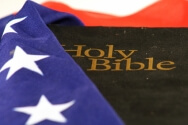
Thomas Jefferson, who wrote the Declaration of Independence, also wrote the Virginia Statute for Religious Freedom. He considered these two of his most important accomplishments, along with founding the University of Virginia, and left instructions for them to be inscribed on his tombstone.
Today, our commitment to religious freedom has gone global, and it has become part of the fabric of our diplomacy. In 1998, Congress passed the International Religious Freedom Act, and now the State Department issues an annual report on religious freedom.
The U.S. even has an Ambassador-at-Large for International Religious Freedom—Dr. Suzan Johnson Cook.
This commitment reflects the scope of the problem. At Bible League International, we have found that religious persecution has left its mark on many areas of the world:
• In Albania, where communist purges “destroyed the human soul,” according to a government official, leaving the Church with many years of work to restore it
• In China, where the government raids underground churches, arrests their leaders and destroys their property
• In India, where Hindu Nationalists force Christians to convert to Hinduism and burn churches to the ground
• In Laos, where Christian women have been raped and murdered in front of their families
• In Nigeria, where an Islamic sect that believes Western ways are evil has killed pastors and church members and destroyed churches
• In Pakistan, where Muslim radicals murdered a Christian government official for opposing the government’s blasphemy law.
Religious persecution is most common against Christians. A Vatican spokesman indicated this spring that 75 out of every 100 people killed because of religious hatred are Christian. Open Doors, a ministry that serves persecuted Christians, says that there are more than 100 million of them around the world.
News of extremists persecuting Christians floods our inbox at Bible League. In general, the Middle East is the least evangelized area of the world because of religious persecution. In the Muslim world, Christian worship takes place behind a veil of secrecy and fear.
But even where persecution takes place, God’s Word has a way of getting through. It would be easy for persecuted Christians in these nations to lose heart. But at Bible League, we have found that no heart is beyond God’s reach.
Witness a miracle that has taken place in Vietnam this year. In one of communism’s last strongholds, all activities are tightly controlled by the government, including religious practices. Most Christians choose to worship in underground house churches due to mandatory church registration.
Late last year, a Bible school in Ho Chi Minh City was bulldozed. Five hundred police, soldiers and firemen showed up at 7 a.m. and began demolishing the property. The pastor was beaten unconscious, and several members of his congregation were detained.
But 2011 has brought new hope—this year marks the 100th anniversary of the first Protestant church in Vietnam. To commemorate the occasion, the Vietnamese government, which tightly controls the printing and distribution of Bibles, has authorized the publication and distribution of up to 100,000 Bibles in 2011 by groups such as Bible League and the World Bible Translation Center.
This spring, as part of the anniversary, evangelist Luis Palau preached in a soccer stadium in Ho Chi Minh City, and thousands accepted Christ. The government later forced the cancellation of Easter events scheduled in Hanoi, but church leaders said they were encouraged by Palau’s visit.
Stories like this one are echoed everyday around the globe. Despite trials and persecution, millions of people have found that God’s Word brings peace and promotes freedom. This Fourth of July, that’s a good thing to remember.
Robert T. Frank is the CEO of Bible League International, a non-profit evangelical Christian ministry dedicated to making disciples and training Bible study leaders and church planters using the Word of God.











































